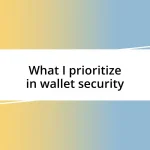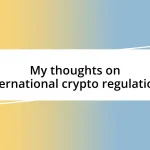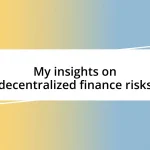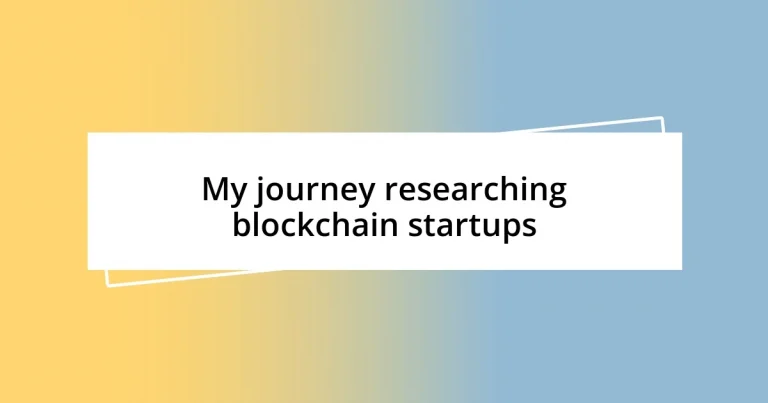Key takeaways:
- Understanding blockchain’s transparency and immutability can transform trust in digital transactions, affecting various industries beyond finance.
- Accurate assessment of blockchain startups requires analyzing the team, user adoption, and the alignment of their business models with blockchain technology’s unique capabilities.
- Documenting findings enhances learning, allowing for deeper insights into each startup’s context and emotional response, ultimately refining investment strategies.
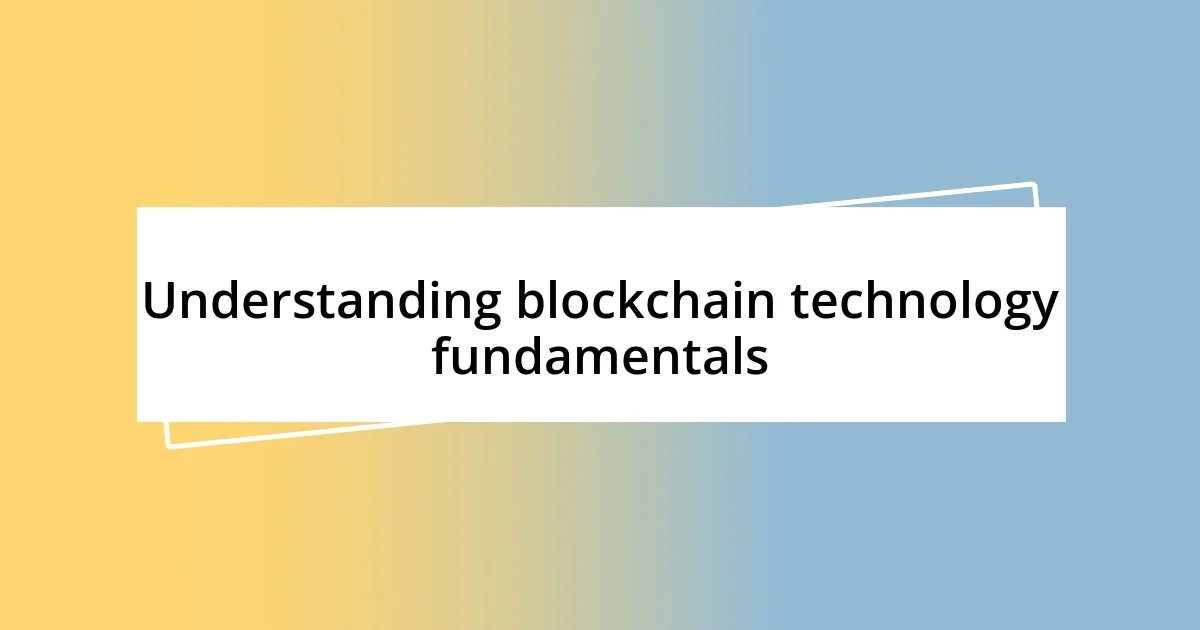
Understanding blockchain technology fundamentals
When I first dove into the world of blockchain, the concept of a decentralized ledger fascinated me. I remember standing in a café, coffee in hand, as I marveled at how blockchain allows information to be stored across a network of computers instead of a single point. It raises an intriguing question: how does this fundamentally alter our understanding of trust in digital transactions?
One of the most striking aspects of blockchain is its transparency. Each transaction is recorded in a manner that anyone can verify, leading to a unique level of accountability. I recall the excitement of mapping out a blockchain transaction on a whiteboard; it felt like revealing the hidden architecture of a digital city. Could this new layer of transparency actually reshape our interactions, not just in finance but across all industries?
Moreover, the idea of immutability—in other words, the inability to alter past transactions—really struck me. Each block is like a time capsule, preserving history in a secure environment. I often wonder, as someone deeply interested in innovation, what other transformative impacts this could have. Can we imagine a legal system built on immutable records? The possibilities feel endless and exhilarating!
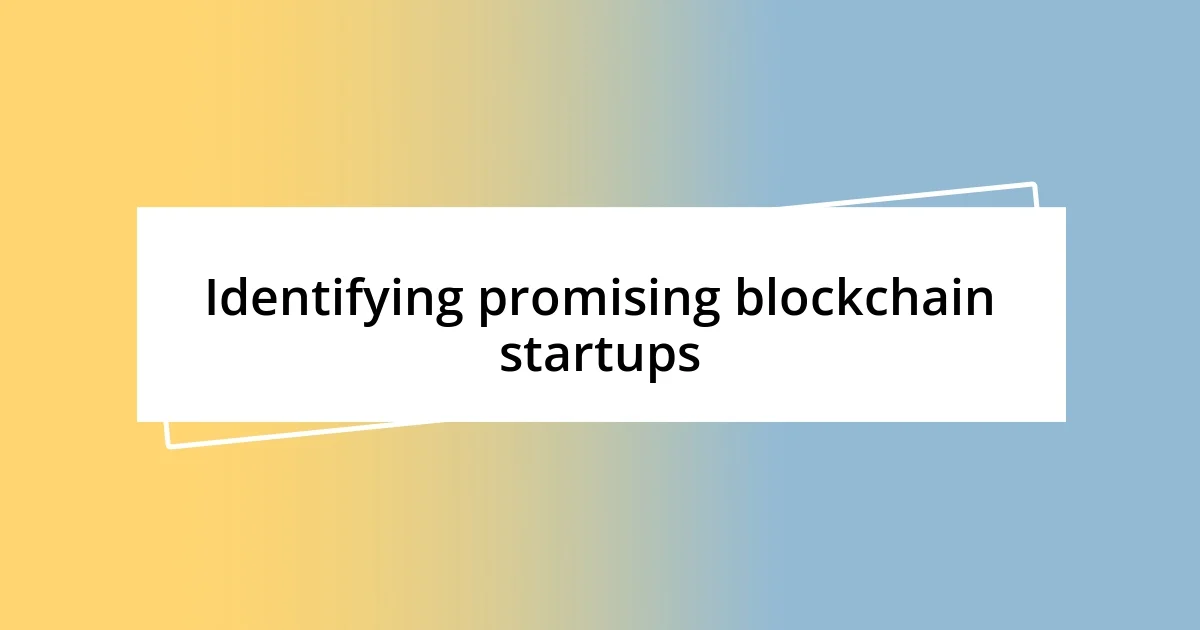
Identifying promising blockchain startups
Identifying promising blockchain startups is both an art and a science. When I started my research, I quickly learned that funding does not always equal potential. I remember poring over pitch decks late into the night, listening for that subtle spark in an idea—the kind that sets apart a promising startup from the noise of countless others.
It’s crucial to evaluate the team behind the technology. A startup may have an innovative idea, but without a passionate and skilled team, execution often stalls. I can recall a moment when I was conversing with a founder who shared the ups and downs of launching their blockchain product. Their resilience and vision gave me faith that they would navigate challenges effectively.
Lastly, user adoption is a significant indicator of a startup’s potential. Observing how a product resonates with its intended audience can offer immense insight. I often find myself intrigued by online communities discussing various projects; the energy around a startup can be palpable and serves as a natural litmus test for its viability.
| Criteria | Details |
|---|---|
| Funding | Initial capital often indicates potential, but alone it’s not a solid measure. |
| Team | A skilled, passionate team is crucial for navigating pitfalls in the startup journey. |
| User Adoption | Community interest and engagement can signal if a product will thrive. |

Evaluating startup business models
When I evaluate startup business models, I often find myself looking at how well the model aligns with the unique features of blockchain technology. For instance, during one of my assessments, I stumbled upon a startup utilizing smart contracts. I felt a rush of excitement realizing that these could automate processes and reduce costs, streamlining transactions in a way that traditional contracts simply can’t match. Understanding whether a startup leverages these innovative features can be a game-changer in distinguishing it from competitors.
- Revenue Streams: Investigate diverse revenue options; models based on transaction fees, subscriptions, or token sales can provide sustainability.
- Market Fit: I believe it’s essential to gauge if the product truly solves a problem for its target audience; an idea might be brilliant, but without a clear market fit, success is questionable.
- Scalability: Consider a startup’s capacity to grow; can their model adapt as technology and market demands evolve?
Through my experience, I’ve learned that a flexible approach often enhances a startup’s resilience. For example, I once encountered a team that pivoted mid-development, shifting their focus based on user feedback. It was a remarkable moment for me—seeing them listen and adapt reminded me just how critical flexibility is in creating a sustainable business model. If a startup can evolve with market dynamics, they often come out resilient, prepared to seize opportunities on the horizon.
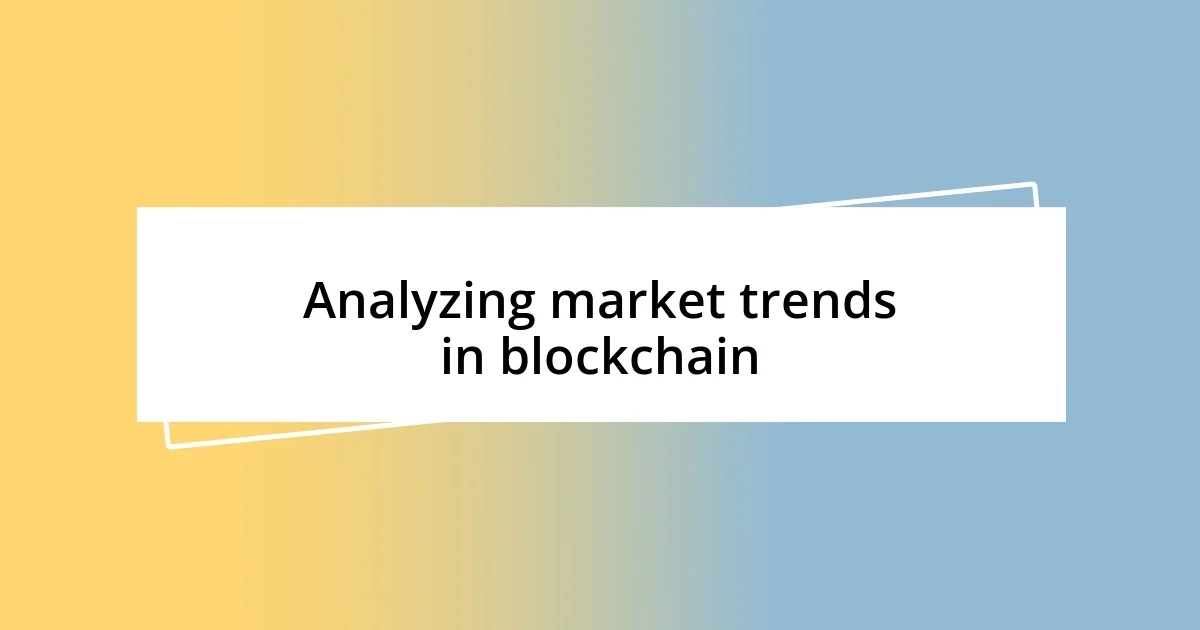
Analyzing market trends in blockchain
To truly grasp the landscape of blockchain, I’ve spent considerable time analyzing market trends. I remember one specific trend that caught my attention: the surge in decentralized finance (DeFi) projects. Witnessing innovative platforms emerge to disrupt traditional finance felt like being part of a financial revolution. This movement not only highlights evolving consumer needs but also emphasizes how blockchain can offer alternatives that were once thought impossible.
As I delved deeper, it became clear that regulatory changes play a significant role in shaping market trends. I found myself engulfed in discussions about government interventions, and it struck me how a shift in regulations could either propel or hinder the growth of blockchain startups. For instance, when I first learned about certain countries subtly embracing cryptocurrency regulations, I felt a sense of optimism; these moves indicate a willingness to accept innovation, which can spark confidence among investors.
Moreover, the ecosystem of blockchain has burgeoned due to the growing interest in sustainability and ethical technology. I recall a moment when I stumbled upon a startup focusing on carbon credits on the blockchain. It was a revelation! Not only was the technology promising, but it also addressed pressing environmental concerns. It made me wonder: how many startups now prioritize sustainability in their mission? I believe that those who align with broader social values will likely resonate more with today’s conscious consumers, particularly in a market that’s evolving into one that demands responsibility alongside innovation.
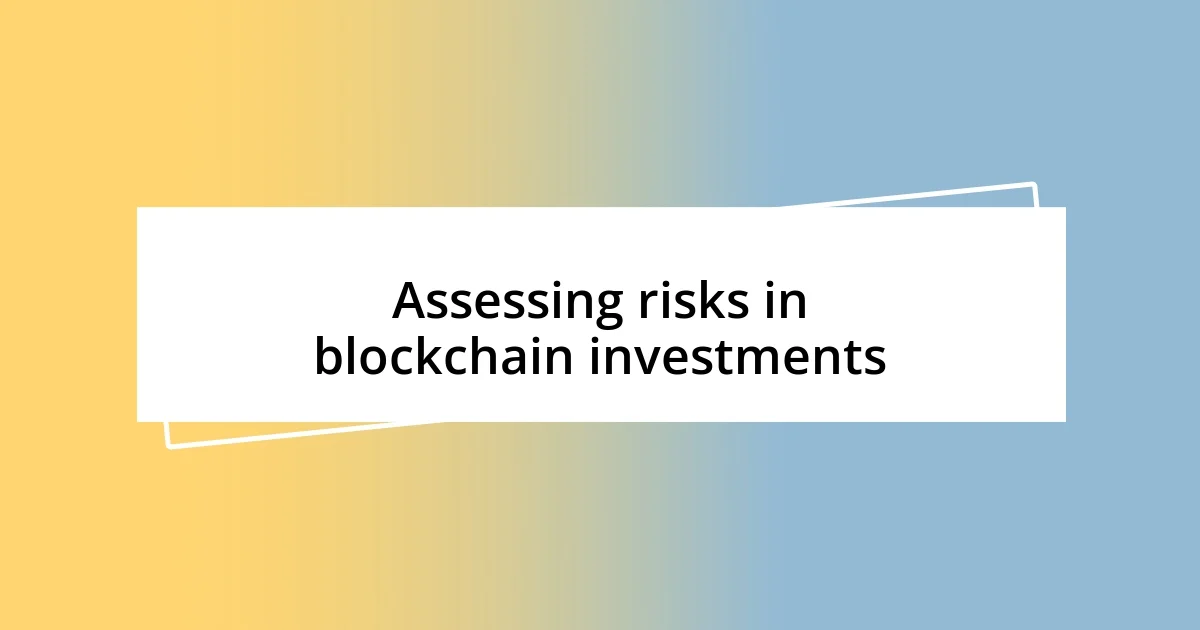
Assessing risks in blockchain investments
When assessing risks in blockchain investments, I’ve learned the importance of due diligence. I remember a startup that seemed promising at first—its concept was innovative, and the team was dynamic. However, as I dug deeper, I uncovered inconsistencies in their whitepaper regarding tokenomics. This finding made me rethink my enthusiasm. It reminded me that before investing, I must peel back the layers to see if there are underlying issues.
Another risk I often consider is the volatile nature of cryptocurrencies. During one project analysis, I witnessed a promising idea plummet as market prices fluctuated wildly. It was a stark reminder of how external factors can impact a startup’s trajectory. Have you ever watched a solid investment turn sour due to market whim? If so, you know that understanding market sentiment is essential.
Finally, I pay close attention to the regulatory landscape surrounding blockchain. I once found myself engrossed in a fascinating session with a blockchain lawyer discussing how changing regulations can abruptly influence startup viability. At that moment, I realized that tracking regulatory shifts is not just an added precaution; it’s a foundation for informed investment decisions. How would you feel if your investment was jeopardized by a sudden regulatory change? Navigating these waters thoughtfully can make all the difference in safeguarding your investments.

Documenting findings and lessons learned
Documenting findings and lessons learned became an invaluable part of my journey. Early on, I developed a habit of keeping a research journal where I could jot down key insights from every startup analysis. This process not only solidified my understanding but also created a resource I could refer back to when evaluating new opportunities. Have you ever realized how writing things down can enhance your learning? For me, it was a game-changer.
One lesson that stands out is the importance of context in each startup’s story. There was a moment when I evaluated a blockchain project focused on supply chain solutions. By documenting the challenges they faced, including skepticism from traditional industries, I realized that the barriers to entry were often as significant as the potential rewards. Sharing these nuanced findings with fellow researchers sparked discussions that deepened our collective understanding. Don’t you agree that context can transform how we perceive success or failure in a project?
Through this documentation process, I also started reflecting on my emotional response to my findings. I remember feeling a mix of excitement and apprehension when I discovered a startup tackling healthcare data privacy. Understanding the challenges and potential pitfalls made me appreciate the courage these founders exhibited. How often do we truly analyze our emotional reactions to projects? Recognizing these feelings helped me refine my investment strategy, steering me towards ventures that aligned not just with financial metrics, but also with my values.



